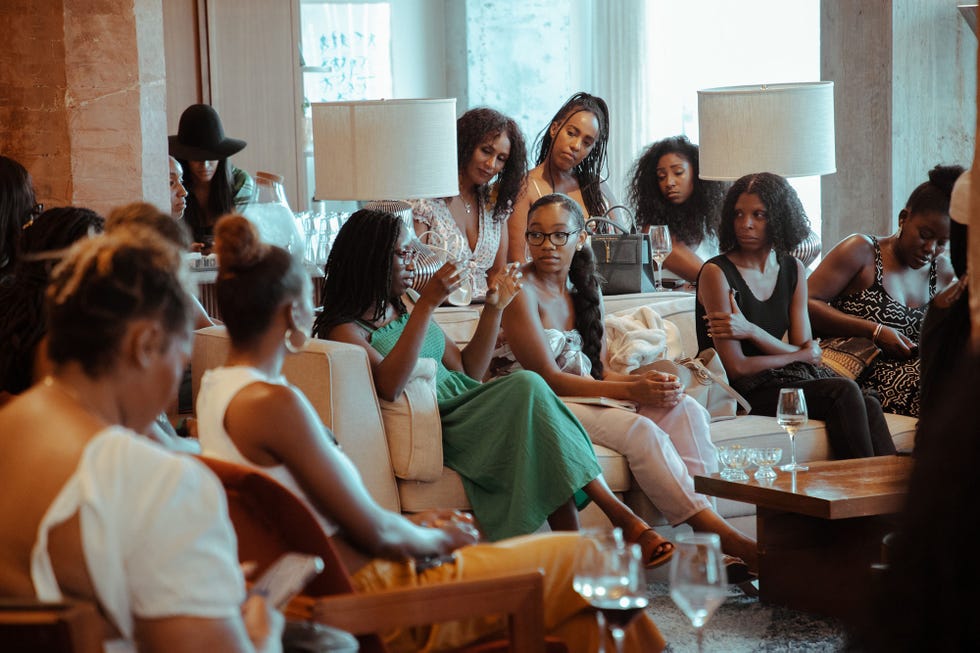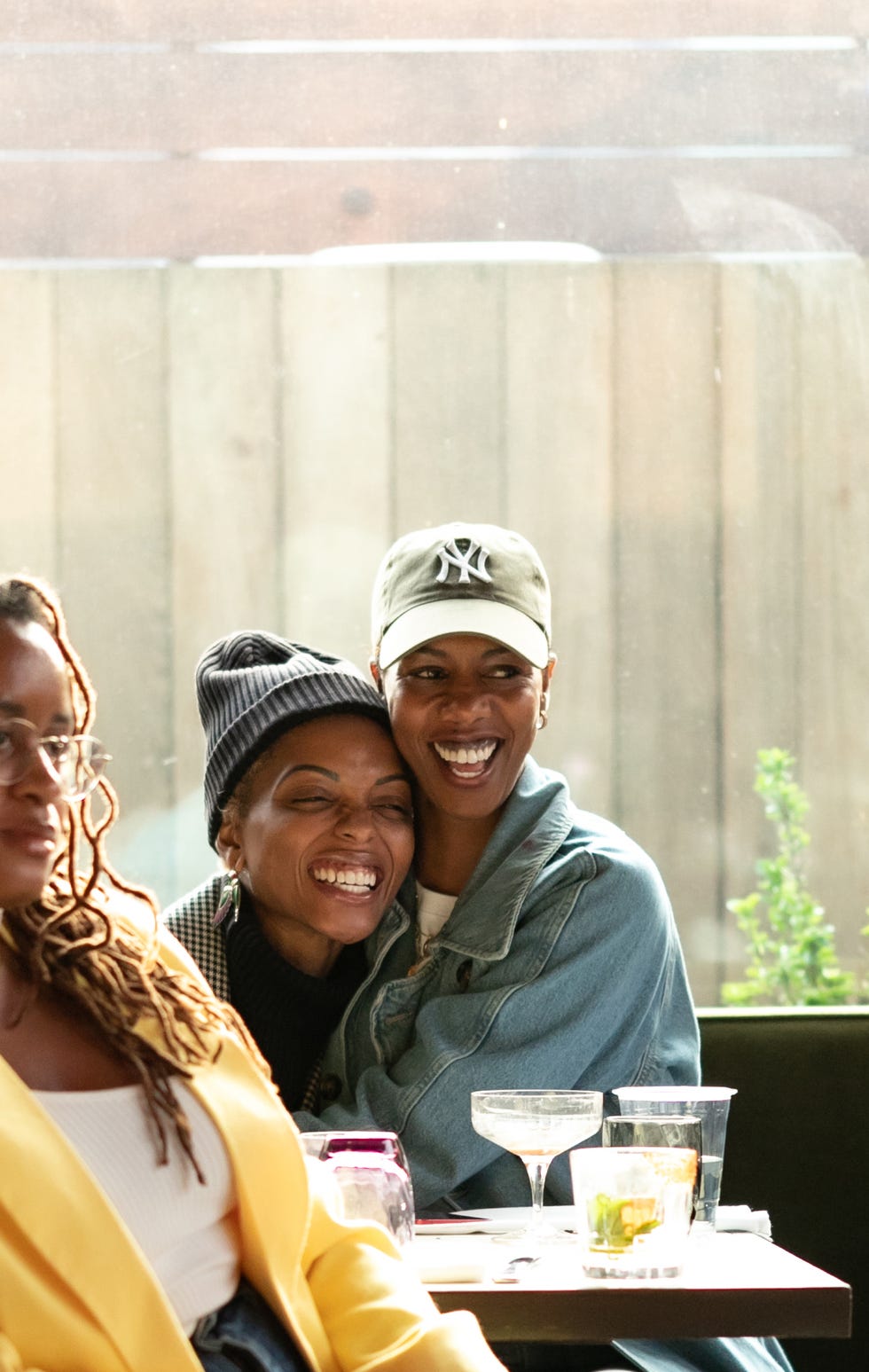There are few things as complicated as the booking page of an Instagram-famous Black hairstylist. You know the one: She has 50,000-plus followers, promotional videos brightened by ring lights, and, of course, an “as.me” link in her bio. You click it, and a bright-pink booking page with bold lettering beckons you in, revealing a maze of red flags that leave you questioning: How badly do you need your hair done?
Today’s hair-booking process feels more like a battle of resilience. Disappointment deepens with every pause. Then comes the scoff at yet another rule. If your hair is too short, expect an extra fee tacked on. Want to secure a spot? You’ll need to channel your inner Hunger Games-esque competitive spirit to snag an available time slot far in advance before it vanishes before your eyes. Oh, and “squeeze-in” fees are a thing—as in, customers can pay extra if they want to be alerted when an appointment miraculously opens in a hairstylist’s calendar. And while you’re held to a strict 10-minute grace period to avoid penalties, don’t be surprised if your stylist takes an hour to begin your service—with no repercussions. Daunting and downright exhausting, the whole hair-booking experience drives you straight to DIY hair videos on YouTube or into the chairs of African braiding shops. Where did the care and connection so unique and vital to the Black community go?
For generations, Black hair salons have served as more than just a place to go for a transformation—they’ve served as tiny havens where community, camaraderie, and wisdom are the threads weaving generations together. These salons were the original social clubs, where many gathered to share life experiences, exchange hair advice and tips, and find a sense of belonging in this crazy world. The salon was where you walked out better than the way you arrived, be it in the form of an expertly executed hairstyle that’s been on your mood board for weeks or having connected with your “auntie” in the chair beside you, or even the stylists themselves.
With the rise of online booking and independent stylists, the dynamics within Black hair salons have indeed shifted. The once personal and familiar relationship between customer and stylist, built on years of trust and mutual care, has taken more of a transactional approach. Appointments have become strictly business, leaving little room for the rich fellowship that used to make the salon experience so special.
“Stylists aren’t thinking, Am I building a relationship with the person coming in? How do I foster that relationship? They don’t care,” Tomi Tolabi, communications lead at Pinterest and founder of The Black Beauty Club, tells ELLE.com. “It’s common for someone to put a deposit down, and then the stylist cancels on them at the last minute without giving them their money back. Or the stylist comes in late, and there’s no apology.”
But just as the sense of community in salons began to wane, an influx of Black social clubs—many of them centered around beauty and fashion—sprung up, seemingly filling the void. These organizations serve as third places: sanctuaries outside of home and work where women can come together to shed tears, share laughter, and discuss adversities and triumphs—no impossible-to-navigate booking site necessary. While an RSVP link grants you access to these intimate discussions, exclusivity isn’t taxed; there are no extra or hidden fees for coming as you are.
There only three rules to follow when you enter The Black Beauty Club. At a recent monthly meeting at Ludlow House on New York City’s Lower East Side, Talabi told a crowd of members: “Be respectful of everyone, listen with an open heart, and instigate more conversations with one another.”
The room was awash in shades of Black and brown faces; eager hands flinched at a chance to grab the microphone traveling around the room, enticing guests to chime in on the night’s topic: The Cost of Desirability and Social Mobility. It’s a subject many Black women contend with at some point in their lives. One attendee even admitted she took a step back from dating, because she tied her sense of self-worth to her dating experiences, a revelation one would typically only feel comfortable making to close friends, or in the chair at the Dominican or African or Jamaican hair salon they’ve frequented for years.
As guards came down, an unbosoming of truths began to spill out. “I’m so here for Black people being mediocre,” panelist Rox Brown said. “‘Black excellence’ is what you define it as.” One guest added: “For such a long time, hair used to be my identity, and it took me shaving it all off to see that it’s just a part of our identity.” And another: “If another Black woman decides to put on her bonnet to go to the deli or to pick up groceries, that is her business. During my first time in France, I saw a Black French woman with a bonnet in the supermarket and I felt safe. I felt seen.” Voices grew impassioned, and the room erupted in laughter, but the warmth of sisterhood and camaraderie never wavered. It’s these pillars that The Black Beauty Club stands on, and the driving force behind Tolabi and fellow co-founder Asmeret Berhe-Lumax, who first created the community on the social audio app Clubhouse in 2020.
With many sequestered to their homes due to a global pandemic, Clubhouse was where people from all walks of life forged relationships through mutual interests and beliefs, shared through video voice notes. The Black Beauty Club’s Clubhouse room began to take off, and once quarantines were lifted, Tolabi and Berhe-Lumax knew an in-person event was the first order of business.
The shift from salon to social club represents more than just a venue change—it shows how Black women are creating and redefining their own spaces through conversations and connections that support their emotional and mental well-being. In a world where they often feel marginalized and silenced, these clubs are a powerful reminder that community will always find a way to thrive, no matter the setting.
Fellow social spaces like The Black Girl Social Club have also cultivated a devoted legion of followers, and dozens of women get dolled up to attend EveryStylishGirl’s tentpole Sip N’ Slay networking event. The latter’s CEO, Nana Agyemang, launched her platform in 2016 to showcase stylish Black women with non-traditional career paths. A journalist at the time, Agyemang grew frustrated with the lack of diversity in the media jobs she entered and wanted to offer a platform for those points of view.
“I was frustrated with being that only voice for Black women, for dark-skinned women, for 4C women, for African women, for first-generation women in the room” Agyemang explains. “I was tired of being the only one in the space. I’m someone that thrives off people succeeding around me.” So, she expanded EveryStylishGirl’s footprint to create a media training program and “business brunch” to help other Black women enter the publishing landscape with ease, resources, and a network of established contacts to grow and learn from.
“[My friends and I] used to travel for brunches, so we led with that messaging as clickbait to get women to show up,” Agyemang continues. “And once they showed up, they realized they fell in love with something way more powerful, which was community, impact, upliftment, and, most importantly, sisterhood.” Each event is designed to help women forge a path, whether in content creation, entrepreneurship, or editorial.
“Sip N’ Slay is for those who are vulnerable,” Agyemang says. “[People who think] I want to launch a business but can’t bootstrap it, because I have no family funds. How about a talk with Hanifa’s Anifa Mvuemba? Or Kendall Miles? Or Jackie Aina? These women are attainable; they didn’t earn anything off fame or connections, but instead through grit, hard work, research, and networking.” Beyond its network, Sip’ N Slay also has a recruitment pool, with HR representatives from publishing behemoths and fashion houses recruiting talent at events. “What’s most important to me is that people feel beautiful and seen,” Agyemang adds. “I want every moment to turn into a photo moment, because that can help make someone feel beautiful and build a digital brand. I hope people leave feeling inspired to take learnings back to their project, podcast, social platforms, dinner party, meetups, et cetera.”
As the popularity of these safe spaces continues to grow, they stand as a testament to the resilience and adaptability of Black women. While salons might no longer function as the central hub of the community, the essence of what made them extraordinary lives on in these new social clubs. The bonds of sisterhood, the exchange of wisdom, and the sense of belonging are all still very much alive—just in a different form. Whether in a salon chair or via social media, Black women will always find a way to connect, uplift, and empower each other. Ultimately, it’s not about where the community gathers; it’s about the fact that it still does.
Nerisha is the Beauty Commerce Editor at ELLE.com, covering all things beauty. She has a penchant for sneakers and nude lip glosses, and spends way too much time re-watching ’90s sitcoms.
This post was originally published on this site be sure to check out more of their content.








